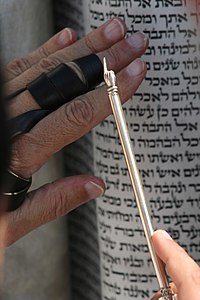Loading AI tools
Jewish ritual pointer From Wikipedia, the free encyclopedia
A yad (Hebrew: יד, romanized: yad; Yiddish: האַנט, romanized: hant, literal translation
"}]],"parts":[{"template":{"target":{"wt":"Literal translation","href":"./Template:Literal_translation"},"params":{"1":{"wt":"hand"}},"i":0}}]}">lit. 'hand') is a Jewish ritual pointer, or stylus, popularly known as a Torah pointer, used by the reader to follow the text during the Torah reading from the parchment Torah scrolls. It is often shaped like a long rod, capped by a small hand with its index finger pointing from it.
Beyond its practical usage in pointing out letters, the yad ensures that the parchment is not touched during the reading. There are several suggested reasons for this, including the mistaken idea that the fragile parchment is easily damaged by skin oils. However, the reason provided by the Talmud and other aspects of Jewish tradition state that the original reason was related to ritual purity.[1][2]
While not required when chanting from the Torah, a yad is used frequently and is considered a hidur mitzvah ("embellishment of the commandment") of reading the Torah.

A yad can be made of any number of materials, though silver is common,[3] especially used in crowning the yad.
The Mountain Jews had a particular way of handling pointers: they were held in pairs forming a V-shape dividing the text into passages. They were made and donated in pairs, even joined with a chain when they had inscriptions related to the same event. Their shapes were of two types: a flat bar and a bar twisted into a long tight screw-like shape with a flat part. In both types, the pointing part is made in the shape of a flat broad leaf with a rounded tip.[4]
From the inscriptions on the pointers, one may deduce a specific ritual of Mountain Jews: before reading, the Torah is displayed to the congregation and the pointer indicated to it as a conceptual parallel to the guiding hand of God.[4]
There are a number of different names for the pointer used by the Mountain Jews, indicating the variety of traditions. Most common ones are etzba (Hebrew: אצבע, lit. 'finger') and kulmus (קולמוס).
Seamless Wikipedia browsing. On steroids.
Every time you click a link to Wikipedia, Wiktionary or Wikiquote in your browser's search results, it will show the modern Wikiwand interface.
Wikiwand extension is a five stars, simple, with minimum permission required to keep your browsing private, safe and transparent.